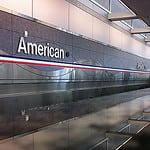Skift Take
It’s likely the 9,700 employees are eager to join an union of their own after watching the pilots’ length negotiations with AMR and the major role the APA union has held throughout the process.
Passenger service agents at American Airlines may be able to vote on union representation after all, a federal appeals court ruled Wednesday, as negotiators for the airline and its pilots union met to restart stalled contract talks.

The court overturned the decision to block a vote for the 9,700 passenger service agents. Photo by Grant Wickes.
After more than a week of flight disruptions that the carrier blamed on pilots reporting more maintenance issues on planes about to depart, American also announced that it will defer changes to pilot pay for night and international flying, planned for this month, now that the two sides are back at the bargaining table.
American has been beset by operational problems in the weeks since a bankruptcy judge approved new cost-cutting contracts for mechanics and flight attendants and gave the company authority to terminate the pilots contract. The pilots were the only union work group to have rejected the airline’s final offer.
This week, rows of seats on at least two American planes came loose in flight, prompting the company to inspect 48 airplanes. American said late Wednesday that all 48 planes were back in service and that it believes the problems are related to the seat tracking and locking mechanism, not the work groups that performed maintenance on the planes.
The appellate court decision vacated a lower court’s opinion that had blocked a scheduled summer vote by 9,700 customer service and gate agents on whether to join the Communications Workers of America. The union said the election process can now move forward, but the company said it would consider other legal options.
In its decision, the Fifth Circuit Court of Appeals said the lower court judge did not have jurisdiction to rule on American’s lawsuit, which claimed that the National Mediation Board needed to implement a new law passed in February requiring unions to collect authorization cards from 50 percent of its workers, not 35 percent, the previous standard.
Citing another case, the appeals court said judicial review of an NMB decision “is only appropriate where there is a ‘plain violation of an unambiguous and mandatory provision of the statue,’ or in other words, where the NMB has committed ‘egregious error.'”
The court vacated the district court’s ruling and sent the case back to the district judge instructing him to dismiss the complaint for “lack of subject matter jurisdiction.”
American had a different interpretation of the ruling.
Although the appeals court ruling explicitly vacated the lower court’s ruling and remanded the case back to the district court, instructing the lower court to dismiss American’s lawsuit, American says it still believes it has legal options in the case.
“The panel’s tentative ruling today suggests that the ’50 percent law’ may still apply to the CWA’s application and may ultimately preclude a valid election,” said American vice president of employees relations Laura Einspanier in a letter sent to employees on Wednesday evening. “The panel implied that further legal review may be appropriate to ensure compliance with the law and protect the rights of both American and the majority of Agents and Representatives who did not support the union’s election application.”
A date has not been set by the NMB for a new union representation election.
Regarding the loose seats on its planes, American said it finished inspecting the 48 Boeing 757s but did not say how many had loose seats. On Tuesday, American said it had identified six planes with improperly attached seats.
“Over the next few weeks, we will continue to work with the FAA and all manufacturers involved to review the corrective action taken,” American spokeswoman Andrea Huguely said. “We believe a contributing factor is with the seat tracking and locking mechanism, not with where the work was performed.”
The problem first came to light on Saturday when American Flight 685 from Boston to Miami had to make an emergency landing at New York’s JFK airport after a row of three seats came loose mid-flight. Another aircraft had a similar problem on Monday, prompting the inspections.
The Transport Workers Union, which represents American’s mechanics, said the seat problem did not stem from labor issues but instead were the result of outsourcing maintenance work.
Huguely said the carrier has the “utmost confidence” in its maintenance teams and contract workers. She added the safety and reliability of its fleet is of “paramount importance” to the company.
(c)2012 the Fort Worth Star-Telegram. Distributed by MCT Information Services.
![]()
The Daily Newsletter
Our daily coverage of the global travel industry. Written by editors and analysts from across Skift’s brands.
Have a confidential tip for Skift? Get in touch
Tags: american airlines, labor
